AudioCulture
The noisy library of New Zealand music
Te pātaka korihi o ngā puoro o Aotearoa
Bleeders
Years of heavy touring and an unsuccessful bid to break North America led them to burn out. However, their subsequent reunions proved the ongoing devotion of their fans, leading to a new EP in 2019, Delusions, and a re-recording of their breakthrough track ‘All That Glitters’ in te reo Māori.
Angelo Munro first became part of the hardcore punk scene in Auckland while in his teens. “When I was around 16, I started going into the city to ride my skateboard and went to gigs at places like the Ellen Melville Centre and the Grey Lynn Community Centre. I started my first band at 18 – Age of Vengeance – which was very much a staunch straight-edge band.”
The straight-edge ethos revolved around being alcohol free and often vegan as well. Up until 1999 the drinking age in Aotearoa New Zealand was still 20 years old. Teenagers couldn’t legally attend many of the gigs held at bars, so bands organised their own all-ages shows outside of the drinking establishments where gigs were usually held. These all-ages shows were a boon for young music fans.
Munro was close friends with a drummer from the scene, George Clark who, while still at Kelston Boys High School, joined with two friends to form DSM. Clark then moved on to legendary Auckland hardcore act Evil Priest (and remained in the band until around 2004). Munro recalls that their friendship led to the idea of forming a group together.
“The DSM boys were really the first friends I made in the punk and the hardcore scene, and we all kind of came through together at the same time. A lot of the hardcore punk in New Zealand at the time sounded like the music out of New York and the East Coast of the US: Cro-mags, Bad Brains, Minor Threat. By the late 90s, people were really going for the metal-influenced sound of bands like Earth Crisis and Hatebreed. We wanted to do something a little bit more melodic, inspired by Californian bands like AFI and Good Riddance.
“There were a couple of new bands emerging with a younger set of musicians and – to be honest – we just started poaching the best of them for The Bleeders. Ian King was the one guy who wasn’t from West Auckland: he was from the North Shore and was in this really cool band called Malcontent. I just thought, ‘I want that guy in my band!’ … In between Age of Vengeance and The Bleeders I did a lot of travelling and spent some time in New York, where I checked out the hardcore scene and saw what was possible if you really put your energy into a band.”
Angelo Munro checked out the New york hardcore scene and saw what was possible
The line-up of Bleeders was completed by Hadleigh Donald (guitarist in West Auckland band Kid Nuisance) and bassist Gareth Stack. The name, The Bleeders, was suggested by their friend Dean Sacred (singer from Evil Priest and a well-known tattooist).
The group launched themselves through heavy gigging, breaking beyond the confines of the hardcore scene to play with guitar bands of all stripes. Fortunately, they also had a connection with a music label. DSM had released music through ElevenfiftySeven Records, the label started by Dean Cameron (bassist from seminal group Balance) and named after his flat at 1157 New North Road.
The Bleeders secured a cheap deal to record at York Street Recording Studio with producer Steve Roberts over the course of a weekend, during which time they recorded and mixed the seven tracks on their EP, A Bleeding Heart (2003). Cameron was overwhelmed by the reaction to the CD, which sold out faster than he could press new copies. He estimates that it sold over 5000 copies.
The key to The Bleeders’ success was their unique ability to create eminently catchy songs while retaining a heavy sound, underpinned by high-in-the-mix fast-paced drums and growling guitars. ‘All That Glitters’ off their first EP was a prime example, with the gang vocals of the chorus ensuring the hook was unmissable, even while the guitars chugged along and let out harmonic screams through the verses. Munro says it was inspired by the situation in the US at the time.
“I was actually in New York City in 2001 when 9/11 happened,” he says. “The George Bush administration started the war on terrorism and there was all this hatred towards Islamic people. ‘All That Glitters’ was just about how you couldn’t just believe what you saw on the news about it. Over the years, people have come up to me and started talking to me as if I believed the same conspiracy theories as them, but it’s not about that sort of thing at all. The lyrics are just suggesting that people read a bit more deeply and think about what is going on, rather than taking everything at face value.”
Their subsequent standalone single ‘So Lonely’ was released through ElevenfiftySeven with distribution through Universal Records, and immediately proved the band’s potential as a crossover act by cracking the Top 30. It came at a time when local music television was at a high point, with TV4 relaunching as full-time music channel C4 in October 2004. Meanwhile, radio was also opening up with the rise of The Rock and Channel Z (the latter was replaced by Kiwi FM in February 2005). The Bleeders took advantage of these new avenues and quickly became the hard rock act of the moment.
It was clear that the band needed to partner with a bigger label to achieve its potential
It was now clear that the band would need to partner with a bigger label to achieve its potential. The Bleeders signed directly to Universal and began planning the recording of their next album. They initially contacted Bill Stevenson (from Descendents and Rise Against Records) and he was keen to work with them, but then a fortuitous offer came out of the blue.
“I’d seen Sal Villanueva’s name quite a lot,” says Munro. “He produced records for Thursday and Taking Back Sunday, as well as some of the bands from Island Def Jam, which was part of Universal. Through the Universal link, he’d been talking to their staff in New Zealand about doing an Elemeno P record. When he came down to produce their record, he met us and said, ‘I want to work with you guys as well.’ It really just kind of fell in our lap. He’d grown up in the hardcore scene and played in this band Murphy’s Law that we liked. He suggested we do some pre-production while he was in the country and see where it took us.”
The band used their advance to fund a trip to Villanueva’s Big Blue Meenie Recording Studios in New Jersey. A nice side benefit of having him involved was that he brought in Danny Diablo from Skarhead (another band he’d produced) to record vocals for their song ‘SOS’.
In later years, Munro and his bandmates came to see their work with Villanueva as possibly being “a little overproduced and polished,” with the vocals pushed to the front and the drums relegated to an undercurrent rather than being as upfront as on the EP. But Munro still says the recording sessions were an amazing experience. Villanueva’s production also made the choruses more striking on catchier songs like ‘Nightmares’.
One of the standout tracks on Sweet As Sin (2006) was the new version of their previous single ‘Out of Time’, written in response to a tragic event that affected them all personally, as Munro explains.
“We had a really good friend called Bryce, but he and his partner Philippa were both killed in a car accident along with their daughter. That was in January 2005 and we wrote the song while it was still really raw for us, just as a kind of therapy for ourselves – to express how we were all feeling. The song evoked all those feelings. It all came together very quickly, because it was written from the heart. I think that showed in the final version too and it was probably our biggest song on that record. I think that anything that evokes strong emotions is always going to come across as your best work.”
Sweet As Sin reached No.2 and was certified gold. The band won Breakthrough Artist and Best Rock album at the 2006 NZ Music Awards.
Munro had been running his own record label on the side since his time in Age of Vengeance, through which he’d put out the first two Evil Priest records. Now he picked up newer acts including Promise of Bloodshed, Kill Me Quickly, and 21 Guns, which led to a new arrangement.
Munro ran his own DIY record label, which picked up newer acts
“Jailbait Records started out very DIY, where I’d be literally organising the covers to be printed and putting them in the CD cases by hand. It was really cool. Then Adam Holt from Universal said to me, ‘I know you do a little label, do you want us to distribute it?’ I decided that would be a good chance to move away from it being just a hardcore label, since I knew a lot of hardcore bands in New Zealand wouldn’t want to have any affiliation with a major label. So I renamed it Deadboy Records. Jailbait was named after a Motorhead song, but that name hadn’t aged very well. If I’d kept it going under that name, I probably would’ve been cancelled!”
Over this time, The Bleeders continued to be incredibly busy as a live act, making regular trips across the Tasman.
“I remember that one of our trips to Australia actually stretched out to a couple of months,” says Munro. “We did a full Australian tour with a band called Gyroscope, which took us everywhere – not just the main cities, but every little town. We’d go to Western Australia and play five shows there, then go across to Newcastle and Coffs Harbour. It was really great. Then during that tour, we got offered a tour supporting Avenged Sevenfold doing arena shows. It was a great opportunity, so we stayed on. We also toured through Australia on another occasion with AFI. Then we did Good Charlotte as well, which was a bit cringe, but put us in front of 10-15,000 people per night.”
The Bleeders also made it over for shows in the UK, which included a career highlight – supporting The Misfits. When it came time to record their next album, they set up at York Street in Auckland.
“When we did our first album, the label threw a bunch of money at us and said, ‘just go for it.’ That album went gold, but I’m sure Universal were hoping it would reach platinum or double platinum, putting us at that Blindspott level. At the same time, we’d been touring a lot and we were tired, so we just wanted to take an easier approach. So it was a mutual decision to take a more stripped-back approach. We quite liked Clint Murphy’s production, so it was an easy choice and that was a really, really fun record to make.”
The Bleeders’ self-titled second album (2007) spun off one of the band’s most enduring singles ‘She Screamed She Loved Me’ which reflected the darker imagery and heavier sound of the album.
“the band was burnt out on the whole pop punk/emo crossover era” – Angelo Munro
Munro recalls: “Lyrically, the song was inspired by Twin Peaks. Musically, the album was a big shift. It’s hard for me as a singer to speak for the guys, but I certainly think that the band was burnt out on the whole pop punk/emo crossover era. We never wanted to be pigeon-holed as part of that scene, but people did associate us with it. The album was a big finger to that kind of music. It was like, ‘let’s write a record that’s really heavy and a bit less melodic, with down-tuned guitars.’”
The album dipped in the Top 40, but the band knew that the only way they would have a sustainable career would be to move overseas where there was more possibility of regular touring, given that illegal downloading had reduced income from album sales.
The band relocated to Toronto, with the idea that this home base would give them ready access to the US market but without being as expensive as American cities.
“There are always different trends in music, and we just felt as if we had to get out of New Zealand or the band might die,” says Munro. “We were friends with the Canadian band Alexisonfire so we moved to Toronto. They gave us shows and were really supportive. That was cool, but then we’d go back to our own shows and we’d be back playing to 80 people. I didn’t mind it, but it was soul destroying for some members of the band: working shitty jobs and living in a really cold country, missing our loved ones. It took its toll and people started to question what they wanted to do. It ended up being the demise of us and we broke up at the end of 2009.”
During their time in the city, they played some impressive support slots. Along with joining (platinum-selling) Alexisonfire for the early part of their album release tour, The Bleeders also played other notable Canadian acts such as Cancer Bats and SNFU (at Canadian Music Week).
George Clark stayed on in Canada and joined Black Lungs, a group formed by Wade MacNeil from Alexisonfire (Clark eventually moved to Australia). Returning home, Munro and Ian King moved back into the territory of crossover hard rock by forming The Leeches with Sam Crocker (Antagonist A.D), “Little Dan” Brenndorfer (Brick vs Face, Die Alone), and Jaden Parkes (Goodnight Nurse), though line-up changes saw Ben Duncan take over on drums and Rob O’Conner also filled in. Meanwhile, Hadleigh Donald spent time in Cobra Khan. Munro then formed a new hardcore group, Wolves, with bassist Gareth Stack (Bleeders), guitarist Matt “Wadzy” Wadsworth (Evil Priest), and drummer Corey Friedlander (8 Foot Sativa, City Of Souls). He also moved in a new direction by starting the shoegaze group, Erase Everything, who put out their debut EP in 2024.
The Bleeders retained a loyal fanbase back home and the band was asked to reunite to perform at the New Zealand Tattoo Festival in 2013, followed by a run of headlining shows which packed out sizable venues such as the King’s Arms.
a run of headlining shows in packed-out venues encouraged the band to re-form in 2017
These experiences encouraged the band to re-form in 2017. They played another run of shows and began to write new material. Hadleigh Donald was no longer available, so the group enlisted guitarist Aaron Goddard (previously in punk group Full Nelson, whose first show was supporting The Bleeders in Tauranga).
In 2019, the Delusions EP arrived and lead single ‘Darkness Falls’ showed their garage punk energy was as ferocious as ever. In a nice throwback to their roots, Delusions came out through ElevenfiftySeven, who put it out as a limited edition 12” vinyl record with a remastered version of the A Bleeding Heart EP on the B-side. The band also paid respect to Kylie Johnson (Cinix, Kali Yuga, Shitripper, Thee Crockettes and Club Stupid) who was one of the only female vocalists in the hardcore scene when they first started out – she featured on the track ‘Enginehead’.
In 2023, The Bleeders embarked on a nationwide tour to celebrate the 20-year anniversary of A Bleeding Heart. They highlighted the strength of that early release by playing the entire EP in order at every show, while also marking the rare move of including a range of covers that they thought their fans would appreciate (with songs by Bad Brains, Danzig, and Dead Kennedys).
The Bleeders also showed they weren’t afraid to try something new, as shown by their decision to record a version of ‘All That Glitters’ in te reo Maori for the Waiata Anthems project. Munro has Māori heritage himself (Te Whakatōhea) and enjoyed the process of reworking the song in te reo.
“It’s actually really cool because it’s not a direct translation,” he says. “When you convert a song from English to Te Reo, you can’t just do a direct translation, because the words won’t have the same rhythm and cadence. I currently work for Ara Pautama [Department of Corrections] as a probation officer and I managed to connect with one of our Māori advisors from Northland – this really cool guy called Danny Hauraki that helps the department work with Māori better and helps people with their cultural competence. He had written waiata before so he agreed to do the translation. I told him what the song was about and he said, ‘Okay, so it’s like you’re setting a fire to the old and starting anew. Thinking for yourself.’ So he chose the phrase, ‘tahuna te ao mārama’, which is burning everything down to start afresh. I was really happy with how it turned out. It’s really different from the original and has a unique power of its own.”
Looking back, Munro is glad to reflect on how The Bleeders were able to evolve out of the hardcore community and create their own path forward.
“When we started the Bleeders, we were very careful not to pitch ourselves as a hardcore band. When I was young, the hardcore scene was a very insular community. It was a very great community which had a lot of cool aspects to it, but it was very closed off. At the same time, we can’t change who we are. A lot of the ethics did come through from that music scene and, in a way, the Bleeders developed our own little community. There were a lot of hardcore kids into us, but also punk kids and pop punk kids. It was almost like a niche community for kids that liked something a little bit edgy, but felt couldn’t fit within hardcore because maybe they weren’t straight edge or not vegan, and that was okay with the Bleeders. And I believe that community still exists. All these years later, we’re playing shows of a similar crowd size to when we first released out debut EP. Those loyal fans who were there at the beginning are still here now, which is really cool.”
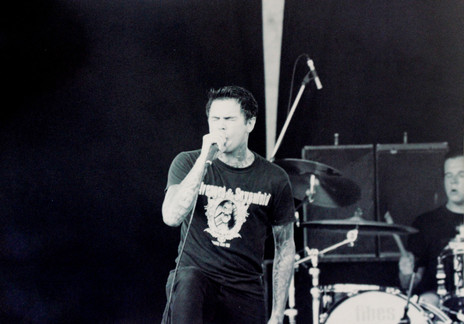
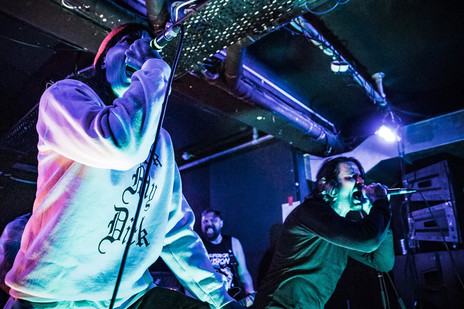
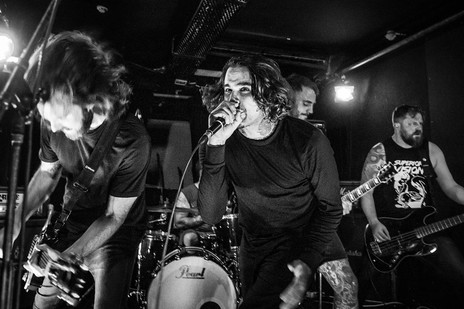
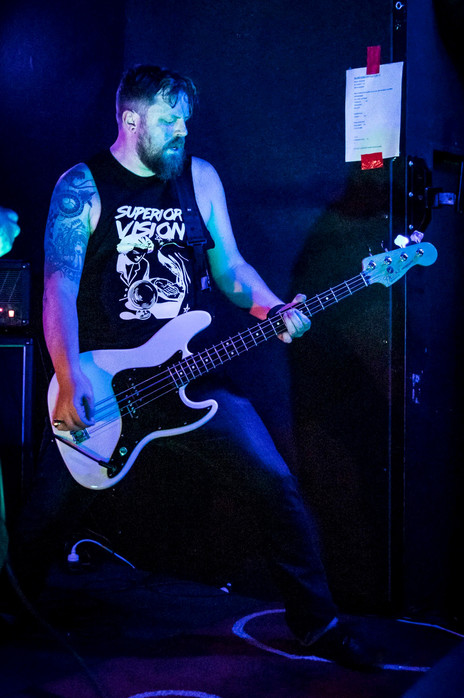
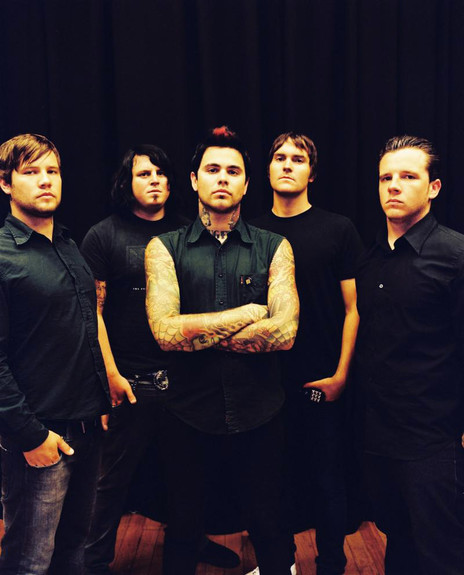
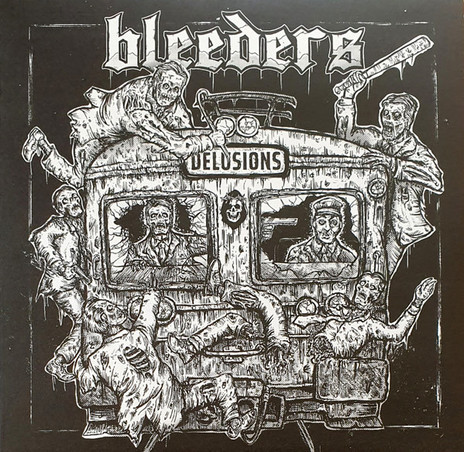
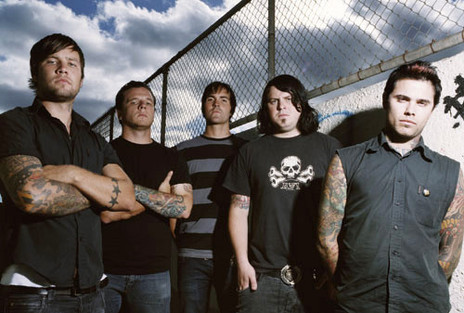
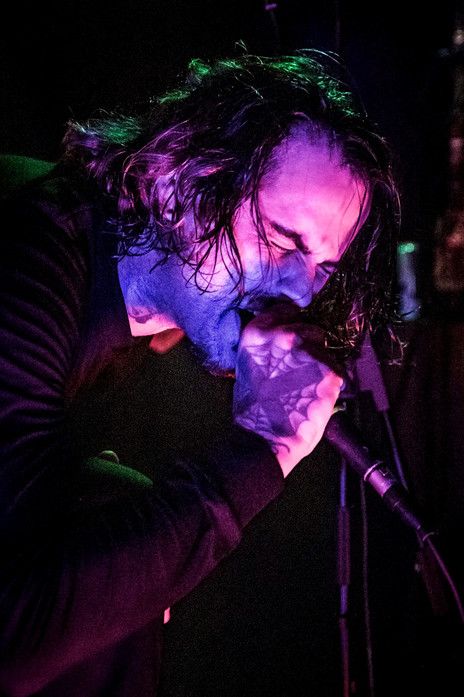
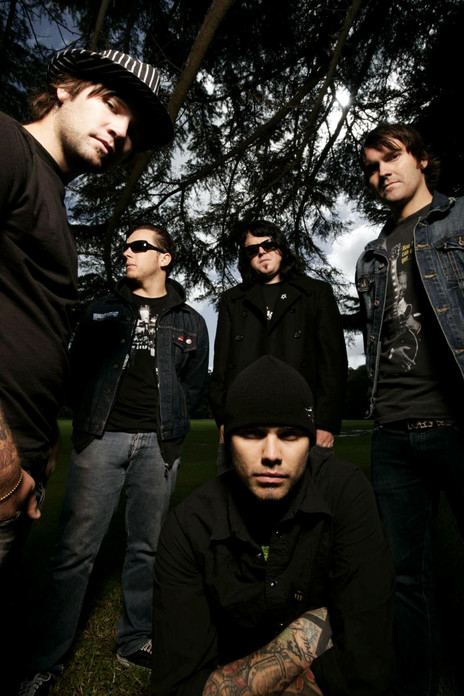
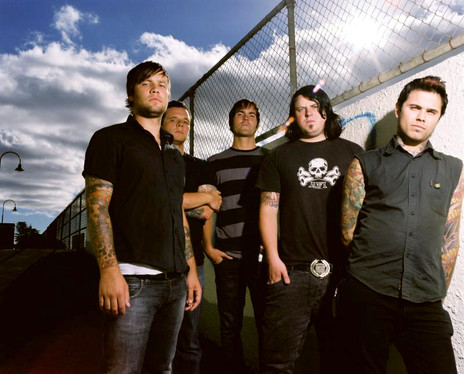

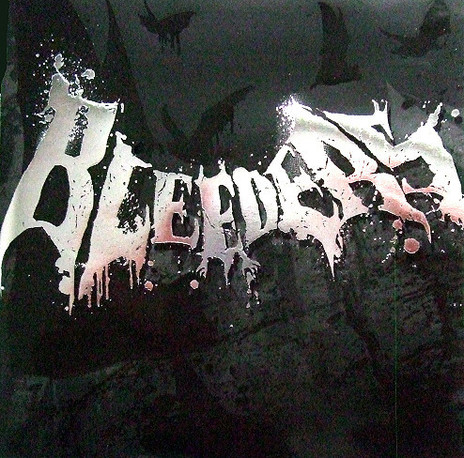
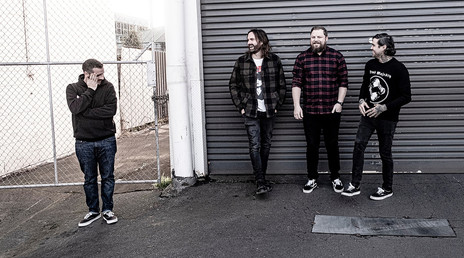
RNZ Retrospective: The Bleeders revisit their debut EP
Interview with Angelo Munro (NZ Hardcore Past and Present (2021)
Universal
Elevenfiftyseven
The Hardcore/Punk Scene in Auckland and Hamilton, 1994-2004
Angelo Munro - Vocals
George Clark - Drums
Hadleigh Donald - Guitar
Ian King - Guitar
Gareth Stack - Bass
Visit our sister site
NZ On ScreenMade with funding from
NZ On Air








